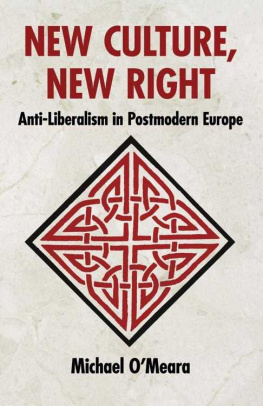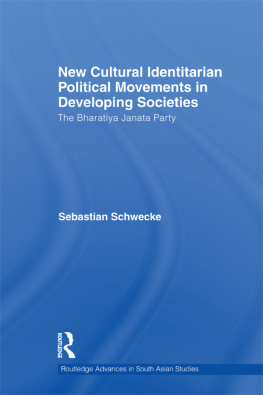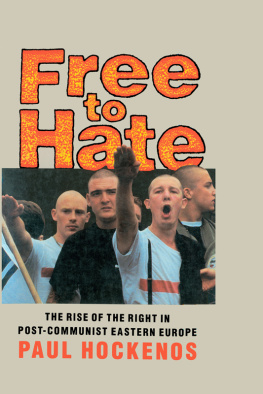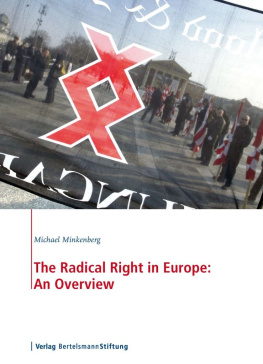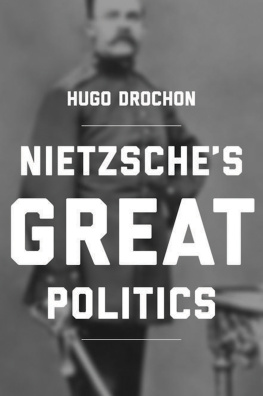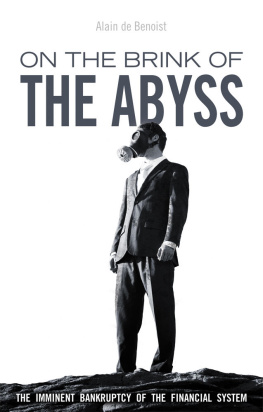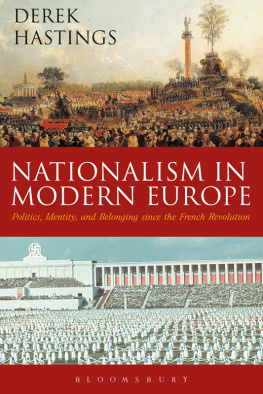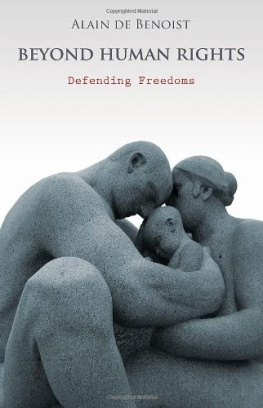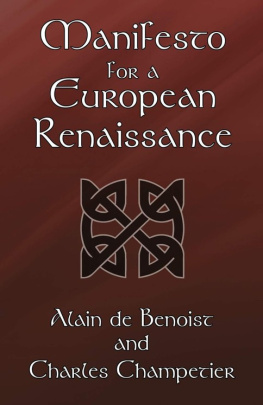New Culture, New Right
First edition published in 2004 by 1stBooks.
Second edition published in 2013 by Arktos Media Ltd.
Copyright 2013 by Michael OMeara and Arktos Media Ltd.
All rights reserved. No part of this book may be reproduced or utilised in any form or by any means (whether electronic or mechanical), including photocopying, recording or by any information storage and retrieval system, without permission in writing from the publisher.
Editor: Matthew Peters
Cover Design & Layout: Daniel Friberg
ARKTOS MEDIA LTD
www.arktos.com
Michael OMeara
New Culture, New Right
Anti-Liberalism in Postmodern Europe
ARKTOS
London, 2013
In memory of my brother
Martin (19491972)
Table of Contents
Preface to the Second Edition
I n early 2003, when the final draft of this book was completed, the various tendencies associated with the European New Right and, more specifically, with the Groupement de Recherche et dtudes pour la Civilisation Europenne (GRECE) were already growing in different directions. Today, these differences have become such that the same book, in endeavoring to chart the principal contours of New Right thought, could not be written. This second edition is thus not an update of the now fragmented New Right (or, better said, the now multiform identitarian resistance) for that would require a different format, with a different aim. This edition re-presents the same global critique of liberalism and of the system now threatening the existence of European peoples everywhere that grew out of the earlier New Right. I have thus refrained from revising my interpretations of 2003, adding new references, or changing the text to allow for recent developments, which would have entailed changing the spirit of the whole work. This edition is new in having been edited and reformatted; and in having certain errors and awkward expressions corrected, an index added, and an obsolete appendix of New Right organizations and publications removed. In a word, it is a more polished version of the first edition.
San Francisco, January 2013
For institutions to exist there must exist the kind of will, instinct, imperative which is anti-liberal to the point of malice: the will to tradition, to authority, to centuries-long responsibility, to solidarity between succeeding generations backwards and forwards in infinitum ... The entire West has lost those instincts out of which institutions grow, out of which the future grows: perhaps nothing goes so much against the grain of the modern spirit as this.
Friedrich Nietzsche
Europe has one aim: to actualize its Destiny. This means, to reconquer its sovereignty, to reassert its mission, to establish its imperium, to give to the world an era of order and European peace.
Francis Parker Yockey
Heres to all Cork men,
Likewise New York men,
Who stand for Ireland the world around.
T. D. Sullivan
Introduction: The True Right
N otions of conservatism and liberalism, which have come to us from English public life, the ideological categories of Right and Left, taken from French politics, or more blanket terms like reaction and progress, derived from nineteenth-century Continental usage, have always meant something quite different in the United States than they have in Europe. In an American work on the European Right, it may be in order, then, to begin with a definition of these terms, though the difficulty in doing so is quite formidable. To start, the historical context out of which they evolved is entirely remote to the American experience, which has never known a culture-bearing aristocracy, an enrooted peasantry, or an insurgent bourgeoisie. In addition to these incommensurable histories, Right and Left originated as parliamentary polarities, whose one-dimensional spatial references rarely did justice to the ideological complexities they represented.
Due to this latter peculiarity, any attempt at approaching these elusive and not very stable designations must start with the Left. What, then, is the Left? While it too eludes easy definition, having assumed multiple guises, in more cases than not it stands for those rationalist ideological tendencies favoring the political impulses of a modernity opposed to the divine order of creation. Inspired by the spirit of Protestant individualism, Newtonian science, and a latent Gnosticism, it believes in the infinite progress of knowledge and the infinite advance toward social and moral betterment.
It consequently places the claims of recent and future experience over and above the alleged irrationalities of traditional ones, whose continuity it endeavors to break. Th e Left, in a word, identifies with the myth of progress, which undergirds its vision of mans possibility, its individualistic faith in reason, its penchant for models, plans, and reforms, and its opposition to the heritage of past generations.
In reaction to the Lefts idealism, the Right opposes its realism. Th e Right as such emerges in defense of ancestral legacies and of the larger spiritual order sustaining these legacies. Unlike the Left, the traditional heritage for it is not a dismal catalogue of absurdities and crimes against humanity, but the backdrop to the way the present is to be apprehended and the future worked out. It likewise believes this heritage offers a glimpse of the transcendent of that which stands outside of time and of the larger possibilities latent in the human condition. Indeed, when true to itself, it is less concerned with conserving customary forms than with realizing their potential in the present. Its principal concern is for what is and what will be, both of which are inseparable from what was. A True Right (of which there have been few historical examples) prefers, thus, to reason in terms of the specific geographic, cultural, racial, religious, and historical realities situating and defining it. Th is means its immediate references are generally long established ones, not ideas about how the world might be if reason were to make a clean sweep of the past. It similarly accepts that man is a flawed creature, adopts a skeptical view of progress and a tragic sense of life; favors enrootment, continuity, and natural hierarchies; and distrusts crusading spirits ignoring what is for the sake of a rationalistic what ought to be.
Because Right and Left, like conservative and progressive, are terms inextricably entwined in modernitys historical weave, they are perhaps better understood in terms of the role they have played in its introduction and development.
Along with the centralizing monarchical state, the traditional ramparts of late medieval Europe were assailed by modernist forces inherent in the rapidly developing market economy, whose moneyed wealth challenged the landed interests identified with the existing forms of hierarchy and authority. Th e founding of the Portuguese East India Empire and the Spanish conquest of the New World at the end of the fifteenth century dramatically accelerated this process, especially in unleashing economic forces powerful enough to sweep away all the motley feudal ties that bound men to their traditional relations. Yet, it was only with the Protestant Reformation (harbinger of both the modern world and the Jewish revolutionary spirit) that the embryonic Left assumed an openly insurrectional stance. Beginning in the German-speaking lands (but assuming their most influential expression in Western Europe, especially England and Holland), anti-papal reformers launched a frontal assault on the traditional, hierarchical, and liturgical bases of ecclesiastical authority. Driven by the radical Hebraic promptings of early Christianity and the considerable financial resources of anti-Spanish Jews, these dissidents attracted the support of a diverse alliance of princes, burghers, and peasants, many of whom were motivated not solely by hostility to Roman corruption, but by their predatory designs on Church real estate.

